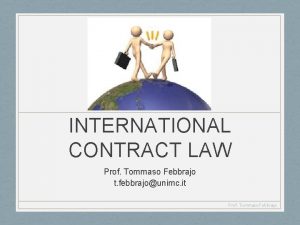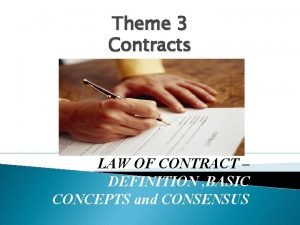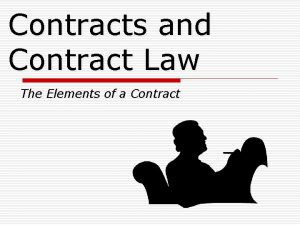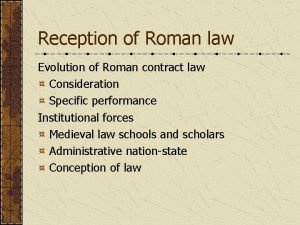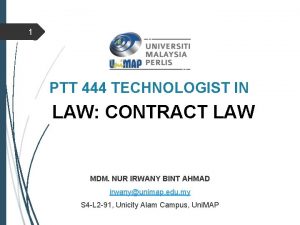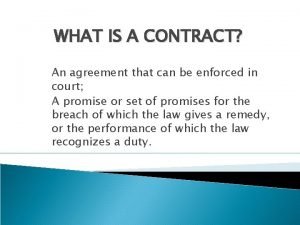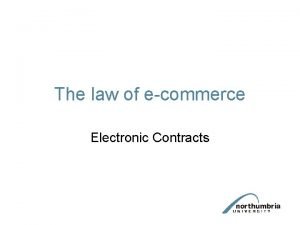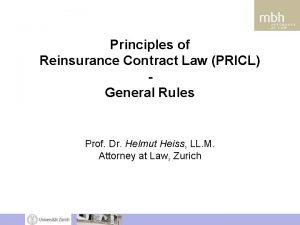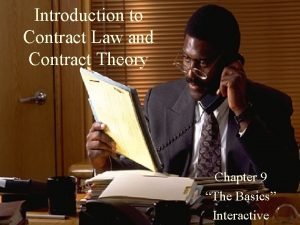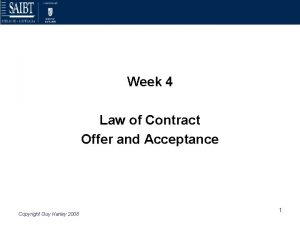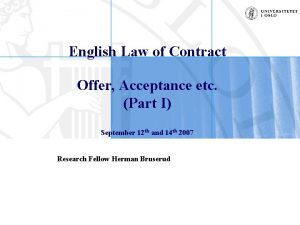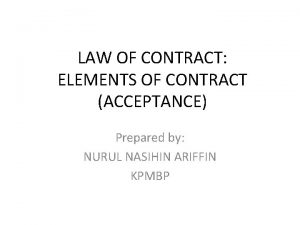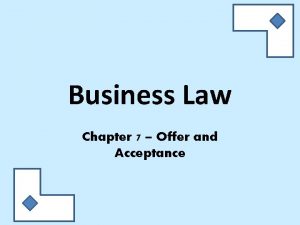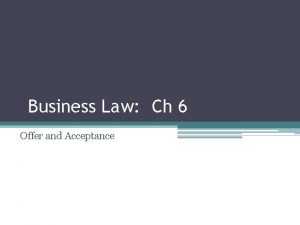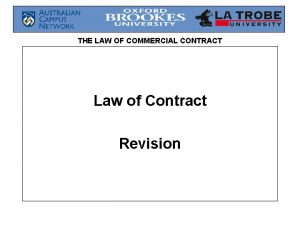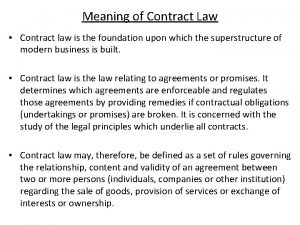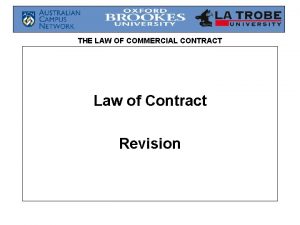Law of Contract Unit 4 Offer and Acceptance



























- Slides: 27

Law of Contract Unit 4 Offer and Acceptance

Learning outcomes: Explain where the terms “offer” and “acceptance” are derived from. Discuss the term “offer” with specific reference to the following: - Elements of a valid offer. - Legal consequences of an offer. - Lapse of an offer. Discuss the term “acceptance” with specific reference to the case of Steyn v LSA Motors.

Study: Hutchison et al Chapter 2 pp. 48 -62. Crawley v Rex. Bloom v American Swiss Watch Co. Steyn v LSA Motors.

General: “Offer”: Invitation to consent to the creation of obligations between 2 or more parties. “Acceptance”: Affirmative response to the above. Contract: The formation of a common intention by the contractants through an exchange of declarations. Outward declarations are necessary for an agreement to have legal relevance. Offer and acceptance declarations indicate the presence of consensus.

Offer and acceptance declarations may also be indicative of where and when a contract generated legal consequences. The time and place of the contract are determined by the rules of offer and acceptance.

The Offer: 1. ELEMENTS OF A VALID OFFER: Offer: Expression of will. Made with the intention of creating an obligationary relationship on certain or ascertainable terms with another. Declaration must be brought to the attention of the addressee, To allow him/her to create a contract, By accepting same offer.

Offer does not require a specific addressee to be valid. Example: Reward offered to broad public. Some types of auction involve an offer made to a specific class of persons. Offer can be made expressly or tacitly. Formalities may prescribe the way of acceptance.

Warrenton Municipality-case: Offer made contrary to public policy will be ineffective. To constitute an offer, a declaration of intention must set out the essential and material terms of the envisaged contract. Often, advertisements and tenders do not comply with the abovementioned requirements. Crawley v Rex.

Even if declaration sets out the detail of a proposed relationship with sufficient certainty, it will only constitute a valid offer if… it was made with the intention that the offeree shall have the power to create a contract… by accepting it. Intention is derived from declaration and surrounding circumstances. All elements must be present to create an obligation.

Is declaration an offer or merely an invitation to negotiate? Depends on whether elements are present, not classification of that declaration. The legal effect of declarations by way of advertisements, catalogues, circulars and display of goods depends on the intention with which offer is made, its content and its form.

Christie: “What distinguishes a true offer from any other proposal or statement is the express or implied intention to be bound by the offeree’s acceptance. ” Should the abovementioned intention be lacking, the offeror lacks the necessary animus contrahendi.

The following will not constitute a valid offer: Offer made; Offer made story; Offer made in jest; in anger; as illustration of how an offer is unintentionally while telling a in a vague impersonal manner; as compliment.

2. Legal consequences of an offer: Liability ex contractu is based on the agreement of the parties. An agreement cannot be created unilaterally. Offer in itself does not create rights and obligations between offeror and offeree. Offer does give rise to the expectation of a future right: offeree has the caacity to create a contract by accepting offer.

Legal consequences of an offer has limited commercial relevance. Offer can be revoked, because it does not create obligation. Because it doesn’t form part of the estate of either the offeror or offeree, an offer lapses at the death of either. Offer cannot be ceded.

3. Lapse of an offer: Oos-Vrystaat Kaap Bedryf Bpk v Van Aswegen: Offer may be revoked by offeror: Reason: Has no obligationary effect. Revocation remains possible up until the moment of conclusion of the contract.

Argument has been raised that the right to revoke offer lapses when offeree commences his/her acceptance. Revocation is effective when offeree receives notice of such revocation. An offeror who neglects to communicate the revocation of his offer to the offeree, may be held liable on subjective grounds.

Because offer is not an asset/liability in the estate of the either the offeror or offeree, it automatically lapses at the death of either. Offer lapses if not accepted by offeree. Counter-offer is seen as a rejection. An inquiry by the offeree merely to clarify aspects of offer does NOT constitute a counter-offer.

Where offer stipulates a period for acceptance, it lapses if not accepted within that period. Otherwise: lapses if not accepted within reasonable time.

Acceptance: Acceptance is also a declaration of will: Lowe v Commission for Gender Equality. Where an offer envisages a unilateral contract involving duties for the offeror only, a tacit acceptance would suffice. A mere enquiry whether offeror would be willing to change certain elements of the offer, does not effect the validity of the acceptance, provided it is not a PREREQUISITE for acceptance.

Christie: An unaccepted offer cannot create a contract. Reason: “Since it emanates from the offeror alone, and the necessary agreement cannot be held to exist without some evidence of the state of mind of the offeree. ”

Who has the power of acceptance? Christie: “A simple contractual offer made to a specific person can only be accepted by that person. ” Acceptance by another person is ineffective and does not create a contract.

STEYN v LSA MOTORS:

FACTS: Mr Steyn was an amateur golfer. Participated in golf day. On one green a motor vehicle was parked nest to a banner that read: Hole in One Sponsored by LSA Motors.

Mr Steyn hit a hole-in-one on that particular hole. When he wanted to claim his prize, he was informed that the prize could only be won by professional golfers. The “offer” made by LSA Motors was only made to a specific group of people. Mr Steyn must have been aware of the regulation that an amateur player was not allowed to win prize money to the value of more than R 600.

DECISION: Mr Steyn is not entitled to the prize. RATIO DECIDENDI: Mr Steyn did not have the power/capacity to create a binding obligation by accepting the offer, because the offer was not directed at him.

Methods of acceptance: Chitty: If a method of acceptance is as advantageous to the offeror as the method ofacceptance prescribed by the latter, will suffice, unless he has made it clear that only his prescribed method will be accepted.

Silence as acceptance: There is a limitation to an offeror’s liberty to indicate the mode of acceptance: He cannot force a contract on the offeree by saying that he will take the offeree’s silence as acceptance. If, however, there was a “duty to speak” on the offeree, his/her silence may well be viewed as an acceptance.
 Offer acceptance consideration
Offer acceptance consideration Offer and acceptance
Offer and acceptance Offer and acceptance
Offer and acceptance Sip early offer
Sip early offer Ias 15
Ias 15 Contingent contract and wagering contract
Contingent contract and wagering contract Newton's first law and second law and third law
Newton's first law and second law and third law Newton's first law and second law and third law
Newton's first law and second law and third law Boyles law
Boyles law Constant of avogadro's law
Constant of avogadro's law International contract
International contract Ignatius v bell
Ignatius v bell Legal definition of contract
Legal definition of contract 6 elements of a contract
6 elements of a contract Roman law
Roman law Pvc price variation clause
Pvc price variation clause Certainty in contract law
Certainty in contract law Quasi contract example
Quasi contract example Postal rule
Postal rule Contingency contract
Contingency contract Principles of reinsurance contract law
Principles of reinsurance contract law Parol evidence rule
Parol evidence rule Introduction to contract law
Introduction to contract law Unit 10, unit 10 review tests, unit 10 general test
Unit 10, unit 10 review tests, unit 10 general test What is discount houses
What is discount houses Composition of inspection and acceptance committee
Composition of inspection and acceptance committee Circle of sexuality
Circle of sexuality Consumer decision making process
Consumer decision making process










